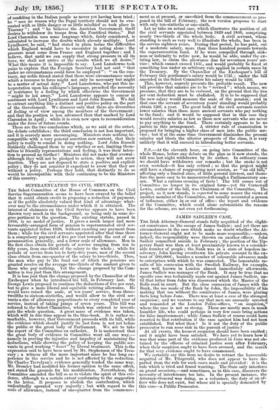JA MRS SADLEIR'S CASE.
THE Irish Attorney-General stands fully acquitted of the slight- est connivance in the escape of James Sullen; and yet there are circumstances in the case which make us doubt whether the At- torneyr-General ought not to be made more responsible,—unless indeed, the responsibility were thrown on another officer. John Sadleir committed suicide in February; the position of the Tip- perary Bank was then at least proximately known to a consider-
able number of people ; the Bank was in a state of hopeless in- solvency, John having overdrawn his private account to the ex- able number of people ; the Bank was in a state of hopeless in- solvency, John having overdrawn his private account to the ex-
tent of 200,000/., besides a number of colourable advances made to enterprises with which he was connected. The lamentable re- sults of his connexion with the Swedish Railway, for example, were well known in London almost immediately afterwards. James Sadleir was manager of the Bank. It may be true that no specific case was technically made out against James Sadleir, un-
til letter from John was discovered which the Master of the
Rolls read in court. But the close connexion of James with the Bank, the use made of the Bank by John, the impossibility of his making that use without the connivance of James, were glaring facts long before June. There was at least a ease of the strongest suspicion; and. we venture to say that men are annually arrested
and remanded at the London Police-offices, "on suspicion,"
where the ease is not so strong. These are mostly men in mall humbler life, who could perhaps in very few cases bring actions for false imprisonment; while James Sadleir of course could have resorted to that retribution if the case against him had not been established. But what then? Is it not the duty of the public prosecutor to run some risk in the pursuit of justice? At all events, the keenest suspicion should have been excited ; and it might have been satisfied. We have yet to learn how it was that some part of the evidence produced in June was not ob- tained by the officers of criminal Justice soon after February, when their suspicion ought to have been aroused, and the search for that very evidence ought to have commenced. We certainly say this from no desire to retract the honourable acquittal of Mr. Fitzgerald, who does not appear to have de- parted from the rule for such cases made and provided: it is the rule which is tried and found wanting. The State only interferes on grand occasions,—and sometimes, as in this ease, discovers the necessity of interference too late. In the present instance, the Attorney-General was doing, as a volunteer, the duty of an of- ficer who does not exist, but whose aid is specially demanded by this case—a Public Prosecutor. .


























 Previous page
Previous page